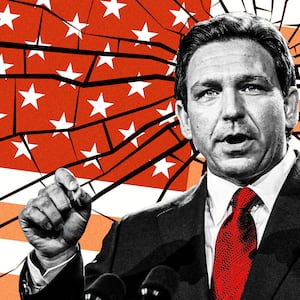Follow the money. When I served as a financial fraud prosecutor with the U.S. Department of Justice, that was our mantra.
Whether investigating multi-billion dollar Ponzi schemes or Medicare fraud or foreign corruption, following the money was a sure way to get to the bottom of something suspicious—which usually pointed to the person at the top of the scam. Following the money not only revealed who was behind the fraud, but often helped reveal the what and why, as well.
A few weeks ago, news quietly emerged that Florida had been reallocating massive amounts of public employees’ pensions to money managers who had contributed to Gov. Ron DeSantis’ political campaigns. That sounds like the usual swamp-dealing, you-scratch-my-back-I’ll-scratch-yours arrangement that ordinary folks often describe as “corruption.”
Before getting to the highly unethical and possibly criminal nature of this behavior, let’s get some background.
The Florida State Board of Administration (SBA) is responsible for investing the proceeds of Florida’s state employee pension plan and other statewide investment programs. In total, the SBA manages over $228 billion—$180 billion of which belongs to the Florida Retirement System Pension Plan, making it the fifth-largest pension plan in the nation.
The Pension Plan is the retirement plan for more than 1 million current and former state employees: police, teachers, etc. The SBA has an executive director who reports to the Board of Trustees, but the Trustees, in concert with legislative directives, have “ultimate oversight” for SBA’s overall strategy. The Board of Trustees consists of DeSantis, Attorney General Ashley Moody, and state Chief Financial Officer Jimmy Patronis.
As with just about any large retirement fund, the Pension Plan invests in a variety of assets, including U.S. stocks, foreign stocks, real estate, fixed income, and cash. The SBA’s Annual Report goes into considerable detail—nearly 30 dense pages filled with small font text and colorful graphs—explaining the Pension Plan’s investment strategy, risk analysis, returns, and allocation of assets, including all the different money managers who have pieces of the $180 billion portfolio. The extensive list of several hundred money manager accounts includes familiar names like Morgan Stanley ($1.85 billion) and less familiar ones like Tiger Iron ($228 million), all of whom receive a fee as compensation for their services.
Nothing in the annual report looks out of the ordinary. But what is striking, as Lever News found, is that in recent years the SBA has transferred more than $1 billion of pension funds to money managers who made substantial political contributions to the Republican Governors Association (RGA), money that later flowed to the Friends of Ron DeSantis political committee. The article provides several detailed examples: $50 million of pension funds going to one particular hedge fund whose principal gave over $1 million to the RGA, and $100 million of pension funds going to a different fund whose founder contributed to the RGA for the first time.

Florida Governor and Republican presidential candidate Ron DeSantis is reflected in mirrors on the wall of a convention center hall as he speaks at the North Carolina Republican Party convention in Greensboro, North Carolina, U.S. June 9, 2023.
ReutersI have not tracked all the dollars flowing from the SBA to managers to the RGA to DeSantis. That is the kind of extremely tedious work that federal agents and prosecutors perform when investigating fraudulent schemes.
Make no mistake, the arrangement suggested by the reporting in the article is possibly criminal. Possibly. Federal securities laws prohibit any money manager from receiving compensation from a government entity within two years after making a contribution to that official. (There’s an exception for contributions of less than a couple of hundred dollars.)
Willful violation of this so-called Pay-to-Play Rule is a crime, punishable by up to five years in prison for each offense. Although the Pay-to-Play Rule is aimed at money managers and other investment advisers, anyone who intentionally helps a money manager commit a crime has also committed a crime. That the money managers who received a slice of the Pension Plan apparently contributed to the RGA—and not directly to DeSantis—cuts against any illegality, but it is not a perfect defense.
Giving money to a third party knowing that it will go to the intended beneficiary (to whom you can’t give directly) is a way to conceal transactions, often called money laundering. At this point, there is no known evidence to accuse anyone of a crime. Of course, that’s what investigations are for.
The article concludes that the SBA’s decision to invest in “donors’ high-fee, high-risk” investments cost state employees about $10 billion in returns. It quotes Kathleen Clark, an ethics expert and professor at Washington University in St. Louis School of Law: “From a distance, it sure looks like the pensioners are getting hurt here. It certainly seems like it raises the distinct possibility that the decisions that the pension board is making may be serving DeSantis’ political interests and not the pensioners’ interest.”
Beyond the potential harm to state employees—the hardworking Floridians whose retirement should never be risked in order to funnel business to campaign donors—there is a billion dollars’ worth of irony in DeSantis’ SBA. After all, the governor rails against the “elites,” claims to represent middle-class families, and brags about draining the swamp in Tallahassee. But his administration has been steadily sending middle-class workers’ savings to the elites who bankroll his campaign, a tailor-made example of the swampy transactional nature of politics that Americans loathe.
On May 24, the same day he announced his run for the presidency, DeSantis signed into law Florida Senate Bill 110, giving the SBA authority to invest an additional 10 percent, or $20 billion, into “alternative investments” such as private equity and hedge funds.
Following the money over time will show us whether this investment strategy is good for Florida’s cops, teachers, and other public employees. And perhaps following the money, if investigators dig into it, will reveal the what and why of an arrangement that raises serious concerns about the relationship between DeSantis, the RGA, and donors who profit from managing Florida’s Pension Fund.
But for now, following the money tells us a lot about the who: a candidate who talks the talk of draining the swamp and working for everyday Americans, but instead of walking that walk, appears to be selling them out to further his political ambitions.










